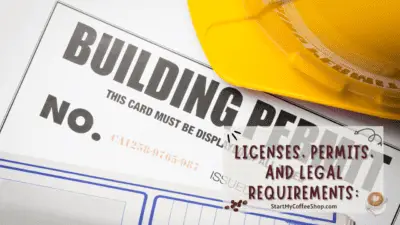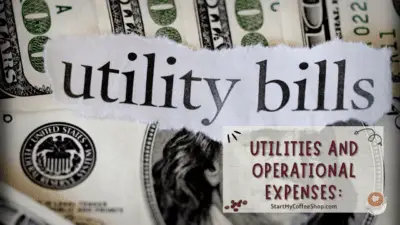Dreaming of running your coffee shop? Before you dive into the aromatic world of freshly brewed beans and cozy ambiances, it’s crucial to understand the financial aspects involved.
The cost to start a coffee shop typically includes costs for equipment, lease or purchase of space, licenses/permits, renovations, initial inventory, marketing, staffing, and utilities. And don’t forget a pinch of luck and a whole latte of love for your venture!
In this article, I will break down the costs associated with starting a coffee shop, giving you a solid foundation to brew your entrepreneurial dreams.
1. Location and Space Costs:
When venturing into opening a coffee shop, one of the initial and substantial expenses to consider is the location and space where your business will operate. Several factors will influence the cost involved, whether you opt for leasing a property or purchasing one.
Size is an essential consideration as it directly affects the rent or purchase price. A larger space might provide ample room for seating and additional amenities but can come with a higher price tag. On the other hand, a smaller space might be more cost-effective, but it could limit the number of customers you can accommodate at any given time.
The condition of the premises is another factor to evaluate. If you choose a space that requires renovations or repairs, it can impact your budget significantly. Renovations might involve costs for plumbing, electrical work, flooring, lighting, and other necessary modifications to meet health and safety standards.
Lastly, the location itself plays a pivotal role. Prime locations in bustling areas or commercial districts often have higher rental or property costs. However, they offer the advantage of increased foot traffic, visibility, and potential customer flow. Assessing the potential benefits of a strategic location against the associated costs is crucial for long-term growth.
2. Equipment and Furnishings:
To craft that sought-after perfect cup of coffee, a comprehensive array of equipment is indispensable. Your coffee shop will require an arsenal of essential tools and machines to deliver the quality and consistency that customers crave.
These essential investments include top-notch espresso machines, coffee grinders to achieve the ideal grind size, blenders for specialty drinks, refrigerators to store ingredients and perishables, brewing equipment for various brewing methods, and reliable POS systems to streamline transactions and manage orders efficiently.
While investing in quality equipment is vital for delivering exceptional coffee and maintaining operational efficiency, it’s important to be prepared for the upfront costs. High-quality machines and equipment can be substantial investments, but they are key to providing a consistent and satisfying coffee experience for your customers.
Consider the long-term benefits and durability of the equipment when making purchasing decisions, as reliability and performance will be crucial to the progress of your coffee shop.
In addition to equipment, furnishings play a significant role in shaping the ambiance and comfort of your coffee shop. Thoughtfully selected tables, chairs, countertops, and decor elements create a welcoming and visually appealing atmosphere.
Investing in aesthetically pleasing and durable furnishings will enhance the overall experience for your customers, making them feel comfortable and enticed to spend more time in your establishment.
3. Licenses, Permits, and Legal Requirements:

Operating a coffee shop comes with a set of legal obligations, including obtaining the necessary licenses and permits. The specific requirements vary based on your location and local regulations. Common licenses and permits include business permits, health permits, food handling permits, and liquor licenses if you intend to serve alcoholic beverages.
To ensure compliance with the law, it’s essential to consult local authorities and understand the specific licenses and permits needed for your coffee shop. Research the applicable regulations, guidelines, and procedures governing the food and beverage industry in your area.
Keep in mind that acquiring these licenses and permits often involves associated fees. Factor in these costs when planning your budget for starting a coffee shop. It’s advisable to consult professionals or seek legal advice to navigate the licensing process smoothly and avoid any potential issues or delays.
By proactively securing the required licenses and permits, you demonstrate your commitment to operating a legitimate and responsible coffee shop. Complying with legal requirements not only ensures your business’s legality but also fosters trust with customers and enhances your reputation within the community.
Read more about Costs Involved in Starting a Coffee Shop: A Sip of Reality
4. Renovations and Interior Design:
To achieve this, renovations may be necessary to transform the space into a haven that reflects your vision while meeting health and safety regulations. It’s essential to allocate a portion of your budget for these renovation costs.
Renovations encompass various aspects, such as plumbing, electrical work, flooring, lighting, and interior design. Plumbing modifications may be required to accommodate coffee machines, sinks, and water supply. Electrical work ensures adequate power supply for equipment and lighting fixtures.
Flooring choices contribute to the overall aesthetic and functionality of the space. Thoughtful lighting design enhances the ambiance and highlights key areas of focus. Lastly, interior design elements like paint, decor, and furniture selection bring your desired atmosphere to life.
Careful planning, research, and consulting with professionals in the construction and design industry will help you estimate the costs involved in the renovation process. Consider obtaining multiple quotes from contractors to ensure competitive pricing without compromising quality.
Remember, investing in renovations not only enhances the visual appeal of your coffee shop but also creates an environment that attracts and retains customers. By prioritizing renovations, you set the stage for a memorable and comfortable experience, setting your coffee shop apart from the competition.
5. Initial Inventory and Supplies:
Stocking up on inventory and supplies is vital for the smooth operation of a coffee shop. It involves procuring a range of items such as coffee beans, milk, syrups, sweeteners, pastries, cups, napkins, and cleaning supplies. To ensure you have adequate stock, it’s important to estimate your daily consumption and project future demand.
By carefully analyzing your expected sales volume and customer preferences, you can determine the appropriate inventory level and associated costs. This planning allows you to maintain a consistent supply of high-quality products, meet customer expectations, and prevent any disruptions to your coffee shop’s daily operations.
6. Marketing and Branding:
To attract customers and establish a strong presence in the competitive coffee industry, strategic marketing efforts are essential. These efforts encompass various aspects, including developing a unique brand identity, creating a compelling logo, designing eye-catching signage, and producing effective promotional materials. Investing in professional design services and printing costs is part of the marketing expenses incurred during the initial stages.
In today’s digital age, a strong online presence is crucial. Implementing digital marketing strategies, such as creating a visually appealing website, optimizing it for search engines, and utilizing social media platforms, can significantly boost your visibility and engage with potential customers.
Additionally, local advertising through targeted channels like community events, partnerships, and local publications can generate buzz and attract a loyal customer base.
7. Staffing and Training:
Hiring and training competent baristas, servers, and kitchen staff is crucial in ensuring exceptional customer experiences. Allocating a budget for salaries, benefits, training programs, and ongoing professional development is essential to foster a motivated and knowledgeable workforce.
When hiring, prioritize individuals who possess not only the necessary skills but also a genuine passion for coffee and customer service. Baristas, with their expertise in crafting delicious beverages and engaging with customers, is the heart of the coffee shop. Servers play a pivotal role in providing attentive and friendly service, while kitchen staff ensures efficient food preparation and maintenance of quality standards.
Investing in competitive salaries helps attract and retain top talent while offering benefits such as health insurance, retirement plans, and paid time off further enhancing job satisfaction.
Training programs should cover all aspects of coffee preparation, customer service, and food safety, with hands-on sessions to ensure consistency. Ongoing professional development opportunities, including workshops and certifications, empower employees to continually enhance their skills.
Regular feedback, performance evaluations, and a supportive work environment foster growth and improvement. Encouraging collaboration and communication among team members strengthens bonds and enhances overall cohesion.
8. Utilities and Operational Expenses:

Utilities play a crucial role in daily operations, including electricity to power equipment, water for brewing and cleaning, gas for heating or cooking, and internet connectivity for POS systems and customer Wi-Fi. Calculate the average monthly costs for these utilities based on the size and needs of your establishment, and factor them into your budget.
In addition to utilities, there are other operational expenses to consider. Insurance is essential to protect your coffee shop from potential risks, such as liability claims or property damage. The cost of insurance coverage may vary depending on factors like location, size, and the scope of coverage.
Hiring professional accounting services can help ensure accurate financial records, tax compliance, and efficient management of your coffee shop’s finances. While the cost of accounting services may vary depending on the complexity of your business, it is a worthwhile investment to maintain financial stability and make informed decisions.
Investing in software systems can streamline operations, enhance productivity, and improve customer service. Point of Sale (POS) systems help manage sales transactions, inventory tracking, and reporting. Additionally, consider software for employee scheduling, customer relationship management (CRM), and marketing automation to optimize various aspects of your coffee shop’s operations.
By including these operational expenses in your budget, you can better anticipate and manage the financial aspects of running your coffee shop. Careful planning and allocation of funds for utilities, insurance, accounting services, and software systems will contribute to the smooth and efficient operation of your business, allowing you to focus on delivering exceptional coffee and customer experiences.
Read more about Costs of Running a Drive-Through Coffee Shop: Exploring the Hidden Price Tag
9. Contingency Fund and Miscellaneous Expenses:
No matter how thorough your planning is, unforeseen expenses can arise in running a coffee shop. It is prudent to allocate a contingency fund to address unexpected situations such as equipment breakdowns, repairs, or emergency maintenance.
Having a financial buffer allows you to handle these unexpected costs without straining your budget or compromising the quality of your operations. Additionally, miscellaneous expenses like permits for sidewalk seating, music licensing fees, or association memberships should be taken into account.
These costs may vary depending on local regulations and your specific business needs. By accounting for these contingencies and miscellaneous expenses, you can better prepare for unexpected challenges and ensure the long-term sustainability of your coffee shop.
Summary
Starting a coffee shop is an exciting but financially demanding endeavor. Understanding the costs involved is crucial for creating a realistic budget and avoiding financial pitfalls. From location and equipment to licenses, marketing, and staffing, every aspect requires careful consideration.
With proper planning, attention to detail, and a passion for coffee, you can embark on this caffeinated journey and create a thriving coffee shop that becomes a hub of community and caffeine lovers alike.
Frequently Asked Questions

Q: What are the ongoing expenses of running a coffee shop?
A: Ongoing expenses include rent or mortgage payments, utilities (electricity, water, gas), inventory restocking, staff wages, marketing and advertising costs, equipment maintenance, and insurance premiums.
Q: Do I need special permits or licenses to open a coffee shop?
A: Yes. These may include business permits, health permits, food handling permits, liquor licenses (if serving alcohol), and compliance with local regulations.
Q: What are some common challenges faced by coffee shop owners?
A: Coffee shop owners often face challenges such as intense competition, fluctuating coffee bean prices, high employee turnover, maintaining consistent quality, attracting and retaining customers, and adapting to changing consumer preferences.
To learn more on how to start your own coffee shop checkout my startup documents here
Please note: This blog post is for educational purposes only and does not constitute legal advice. Please consult a legal expert to address your specific needs.

Hi! I’m Shawn Chun
My adventure in coffee began when I first launched my first coffee shop back in the early 2000s. I had to figure out so many things on my own and to make it worse within 2 years of opening two large corporate coffee chains moved in just blocks away from me!
As I saw smaller and even some larger coffee shops in the neighborhood slowly lose customers to these giant coffee chains and slowly close up shop, I knew that I had to start getting creative…or go out of business.
I (like you may be) knew the coffee industry well. I could make the best latte art around and the foam on my caps was the fluffiest you have ever seen. I even had the best state-of-the-art 2 group digital Nuova Simonelli machine money could buy. But I knew that these things alone would not be enough to lure customers away from the name brand established coffee shops.
Eventually, through lots of trial and error as well as perseverance and creativity I did find a way to not only survive but also thrive in the coffee/espresso industry even while those corporate coffee chains stayed put. During those years I learned to adapt and always faced new challenges. It was not always easy, however, in the end, I was the sole survivor independent coffee shop within a 10-mile radius of my location. Just two corporate coffee chains and I were left after that year. All told the corporate coffee chains took down over 15 small independent coffee shops and kiosks and I was the last one standing and thriving.
Along the years I meet others with the same passion for coffee and I quickly learned that it is not only “how good a barista is” that makes a coffee shop successful, but the business side of coffee as well.
Hence why I started this website you are on now. To provide the tools and resources for up and coming coffee shop owners to gain that vital insight and knowledge on how to start a coffee shop successfully.
Stick around, browse through my helpful blog and resources and enjoy your stay! With lots of LATTE LOVE!
Shawn







